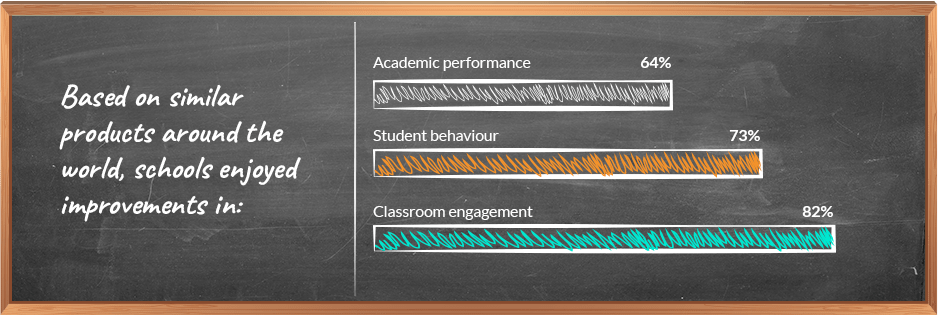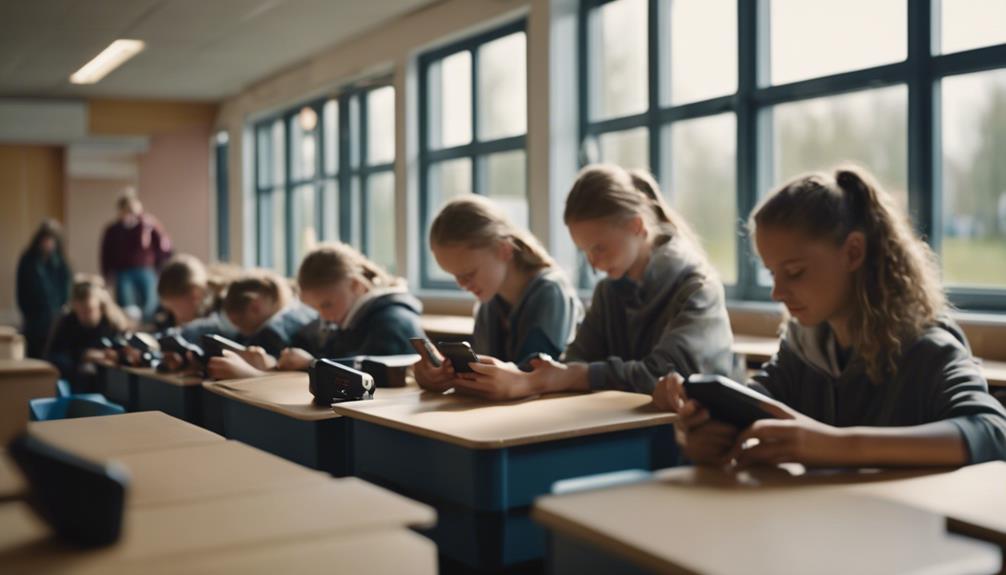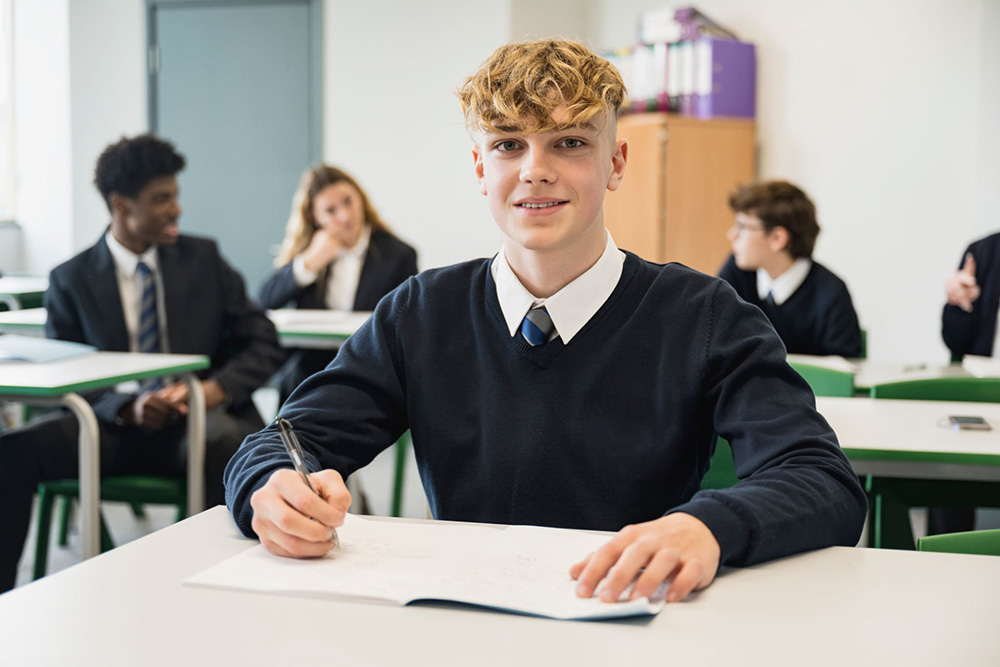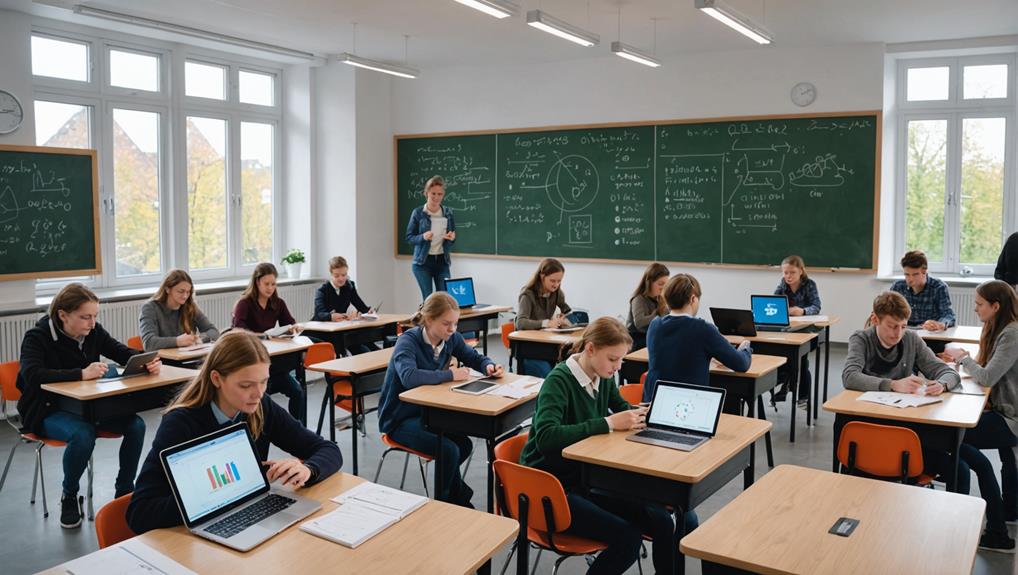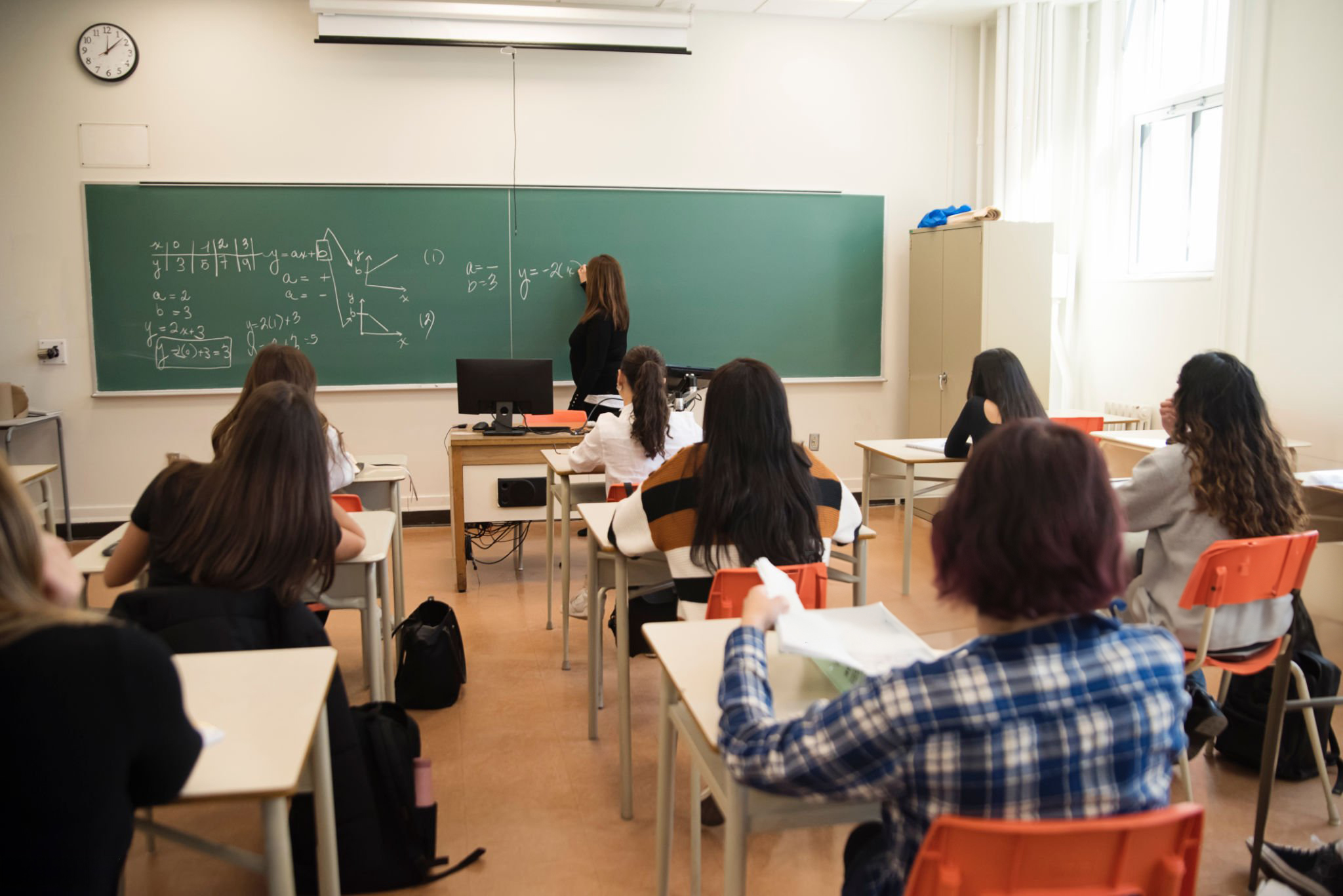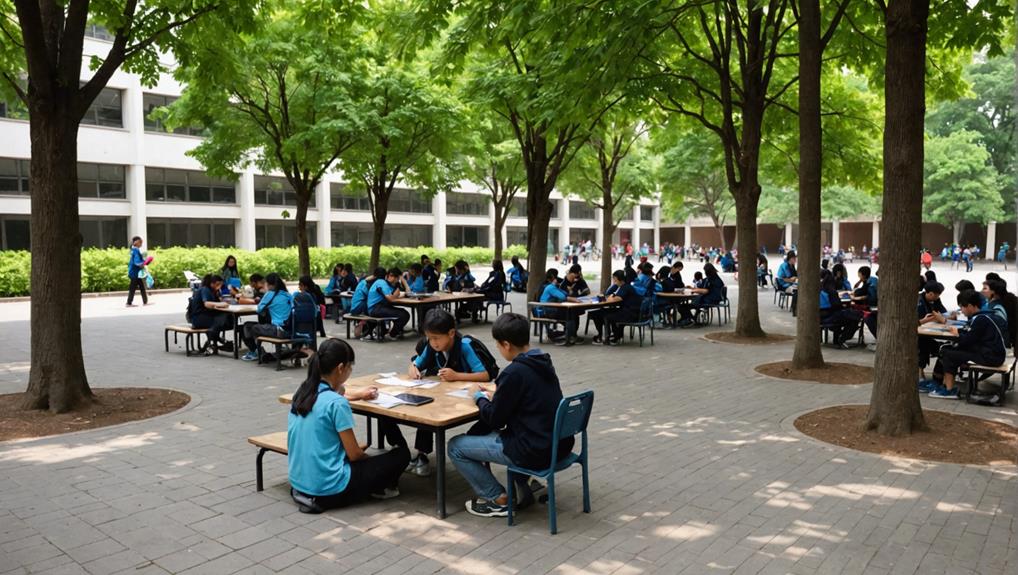L’Australia vieta i cellulari in classe
L’Australia vieta i cellulari in classe
L’Australia vieta i cellulari in classe
In una mossa per migliorare i risultati di apprendimento e ridurre le distrazioni, nel 2023 l'Australia ha annunciato il divieto di utilizzo dei telefoni cellulari in classe, ad eccezione dell'Australian Capital Territory (ACT). Nel frattempo, alle scuole non statali è stata concessa la discrezione di decidere e implementare le proprie politiche.
Riepilogo
Tutti gli stati australiani hanno implementato il divieto dei telefoni cellulari nelle scuole, ad eccezione dell'Australian Capital Territory (ACT).
Il divieto mira a migliorare i risultati di apprendimento e a ridurre le distrazioni causate dall'uso del telefono cellulare nelle scuole.
Il divieto impone agli studenti di tenere i cellulari lontani da casa per l'intera giornata scolastica, ma consente loro di portarli con sé per contattare i genitori o gli altri tutori prima o dopo l'orario scolastico.
Anche le scuole private in Australia hanno implementato il divieto di utilizzo del telefono cellulare per ridurre le distrazioni, contrastare il cyberbullismo e migliorare i risultati di apprendimento.
Come è avvenuto il divieto di utilizzo dei telefoni cellulari in Australia
Nel 2020, Victoria è stato il primo Stato a implementare il divieto di utilizzo dei telefoni cellulari nelle scuole. A questo è seguito il Queensland nel 2021, poi nel 2023 hanno fatto lo stesso anche il South Australia e il New South Wales.
Lo scopo principale di questa politica è migliorare i risultati di apprendimento e ridurre le distrazioni causate dall'uso del telefono cellulare.
Il divieto ha causato una serie di reazioni da parte di genitori, studenti e scuole. I genitori hanno espresso le loro preoccupazioni su come ciò inciderà sulla sicurezza dei loro figli e sulla loro capacità di comunicare con loro in caso di emergenza.
Tuttavia, un anno dopo, i risultati sono stati molto positivi:
- 81% afferma che l'apprendimento degli studenti è migliorato da quando i telefoni cellulari sono stati vietati
- L'87% dei presidi afferma che gli studenti sono meno distratti in classe da quando i telefoni cellulari sono stati vietati
- L'86% dei presidi afferma che la socializzazione è migliorata dopo il divieto di utilizzo dei telefoni cellulari

Quali sono le regole per Stato e Territorio?
Australia Occidentale: Gli anni K-6 nelle scuole pubbliche non possono avere un telefono in loro possesso, mentre gli anni 7-12 sì, ma deve essere spento e messo via. Gli smartwatch devono essere tenuti in modalità aereo a scuola.
Territorio del Nord: Gli studenti dalla scuola materna al sesto anno nelle scuole pubbliche non possono avere un telefono in loro possesso. Gli anni dal settimo al dodicesimo anno possono avere un telefono a scuola, ma deve essere spento e conservato in modo sicuro. Gli smartwatch devono essere in modalità aereo.
Australia Meridionale: Gli studenti delle scuole pubbliche devono tenere i loro cellulari e altri dispositivi personali, come gli smartwatch, spenti e riposti mentre sono a scuola. Ogni scuola ha la sua politica su come questo funziona in pratica.
Queensland: Gli studenti delle scuole pubbliche devono tenere i cellulari spenti e "fuori per il giorno" durante l'orario scolastico. I dispositivi indossabili, come gli smartwatch, devono avere le notifiche disattivate. Ogni scuola ha la sua politica su come funziona.
Nuovo Galles del Sud: L'uso del telefono cellulare da parte degli studenti è vietato nelle scuole primarie e superiori pubbliche. Esistono vari modi in cui le scuole possono implementare il divieto a livello locale.
Territorio della Capitale Australiana: Gli studenti degli anni P–10 non possono usare o accedere a telefoni cellulari o altri dispositivi di comunicazione personali durante la giornata scolastica o durante gli eventi autorizzati dalla scuola. Gli studenti degli anni 11 e 12 possono avere i loro telefoni, ma devono riporli durante l'orario scolastico. Tasmania: gli studenti degli anni K–12 devono tenere i loro telefoni cellulari spenti e riposti durante l'orario scolastico. Ogni scuola ha la sua politica.
Vittoria: Gli studenti devono tenere i telefoni spenti e riposti in modo sicuro durante l'orario scolastico. Ogni scuola ha la propria politica su come funziona in pratica. Dispositivi indossabili, tablet e altri dispositivi personali devono avere le notifiche disattivate.
Come hanno implementato il divieto le scuole australiane?
Ogni scuola ha la propria politica su come attuare il divieto, incluso dove conservare telefoni, smartwatch e tablet, nonché le conseguenze in caso di inosservanza.
Per motivi di sicurezza, gli studenti possono portare i propri telefoni a scuola quando vanno e tornano da scuola e per essere contattati prima o dopo le lezioni.
Il divieto in alcune scuole è informale, mentre altre hanno modi precisi per garantire che il divieto venga implementato. Qui a Phone Locker, abbiamo aiutato molte scuole in tutta l'Australia (e nel mondo) con la nostra innovativa custodia per telefono bloccabile, a cui si può accedere di nuovo solo utilizzando una stazione di sblocco magnetica alle uscite della scuola (scopri come funziona).
Le custodie per telefono con serratura:
- Permette allo studente di mantenere il controllo della propria proprietà
- Evita i confronti con la “confisca” dei telefoni
- Previene imbrogli e altri usi non autorizzati
- Può avere la capacità di bloccare completamente il segnale
- Può essere marchiato e si adatta a tutti i telefoni
Per qualsiasi implementazione delle custodie Phone Locker, forniamo assistenza durante il lancio e disponiamo di tutto, dai modelli da scrivere ai genitori alle linee guida FAQ per gli studenti. Contattaci per parlare della tua scuola per una chiacchierata senza impegno.
Quali sono stati i risultati del divieto a distanza di un anno?
Il NSW ha risultati annunciati dopo un anno di attuazione, affermando che il divieto di utilizzo dei telefoni cellulari ha migliorato l'apprendimento e la concentrazione degli studenti e ha incoraggiato i giovani a socializzare di più.
Di conseguenza, gli esperti chiedono un divieto coerente a livello nazionale. Lo psicologo infantile Michael Carr-Gregg ha chiesto una politica nazionale sulla questione che includa le scuole private. Ha affermato;
"Pregherei Jason Clare di parlare con i presidi che hanno fatto questo (e di considerare) un divieto nazionale coerente. Se hai un divieto di telefonia mobile in una scuola, otterrai più interazione sociale, meno distrazioni e voti migliori"
Nel frattempo, il premier dell'Australia Meridionale Peter Malinauskas ha affermato che "le prove ci sono": i bambini giocano tra loro e non con i loro telefoni e c'è stata "una riduzione dei comportamenti inappropriati".
I dati di segnalazione scolastica dello Stato indicano un 63% calo degli “incidenti critici che coinvolgono i social media” nella prima metà di quest'anno rispetto allo stesso periodo del 2023 prima del divieto.

Ulteriori letture…
Attuazione nel Queensland
L'attuazione del divieto di telefonia mobile nel Queensland è entrata in vigore nel primo trimestre del 2021. Il nuovo divieto ha imposto un divieto generale all'uso dei telefoni cellulari in tutte le scuole statali del Queensland, mentre le scuole non statali avranno la discrezione di decidere e attuare le proprie politiche. Il 95% delle scuole statali nel Queensland aveva già politiche in atto che proibiscono l'uso dei telefoni cellulari durante le ore di lezione.
Una revisione condotta dall’ex commissaria per la famiglia e l’infanzia del Queensland, Cheryl Vardon, ha raccomandato il divieto di telefoni e di alcuni dispositivi indossabili durante l’orario scolastico. Ciò richiederà agli studenti di tenere i telefoni lontani per l’intera giornata scolastica, ma potranno comunque portarli per contattare i genitori o gli accompagnatori prima o dopo l’orario scolastico. Le scuole private hanno la facoltà di decidere e attuare le proprie politiche riguardanti l'uso del telefono cellulare.
Come le scuole di altri paesi, molte scuole hanno preso l'opzione di implementare la serratura Custodia magnetica per telefono Phone Locker, dove gli studenti possono tenere i loro telefoni, ma possono accedervi solo quando è consentito. Questo affronta i problemi di archiviazione dei telefoni cellulari e impedisce che venga percepito come una misura punitiva per gli studenti.
Divieti di altri stati
Sulla base dell'implementazione del divieto di telefonia mobile nel Queensland, anche altri stati australiani hanno implementato i propri divieti sull'uso del telefono nelle scuole pubbliche. Victoria, Western Australia, Tasmania, Northern Territory e South Australia hanno adottato politiche simili rispettivamente nel 2020 e nel 2021. Nel 2023, anche South Australia e New South Wales hanno implementato divieti.
Le preoccupazioni e le opinioni dei genitori sul divieto variano, ma molti riconoscono il potenziale impatto sul comportamento degli studenti della limitazione dell'uso del telefono durante l'orario scolastico. Altri paesi, come la Francia, hanno implementato divieti simili con efficacia variabile. Sono state prese in considerazione alternative al divieto dei telefoni, come l'educazione all'uso responsabile, ma alla fine sono state ritenute insufficienti.
Dovranno essere affrontate le potenziali sfide nell’applicazione del divieto, come il rispetto delle norme da parte degli studenti e il monitoraggio degli insegnanti. Il divieto nelle scuole private, invece, è lasciato alla discrezione delle singole scuole. Sebbene l’approccio possa differire da stato a stato, l’obiettivo è lo stesso: migliorare i risultati dell’apprendimento e la sicurezza degli studenti.
E le scuole private?
Mentre le scuole statali in Australia hanno implementato divieti generalizzati sull’uso del telefono cellulare, le scuole private hanno la discrezionalità di decidere e attuare le proprie politiche riguardanti l’uso del telefono cellulare.
Alcune scuole private, come la SCEGGS Darlinghurst di Sydney, hanno introdotto il divieto di utilizzo dei telefoni cellulari con l'intento di ridurre le distrazioni, contrastare il cyberbullismo e migliorare i risultati di apprendimento.
Le scuole private possono anche prendere in considerazione l'uso dei telefoni cellulari per benefici educativi a determinate condizioni. L'applicazione della politica può variare da scuola a scuola, poiché la comunicazione dei genitori è incoraggiata per garantire un'implementazione di successo.
Gli studenti potrebbero essere in grado di utilizzare i propri telefoni per sicurezza durante gli spostamenti da e per la scuola o per comunicazioni di emergenza con i genitori. Inoltre, le scuole possono approvare esenzioni in circostanze eccezionali.
Attraverso questo, le scuole private mirano a migliorare il coinvolgimento degli studenti e creare un ambiente favorevole all’apprendimento, pur consentendo la necessaria comunicazione tra gli studenti.
Il divieto ha avuto un impatto significativo sulle dinamiche della classe. Con i telefoni off-limits, gli studenti devono ora concentrarsi sul compito da svolgere, il che può migliorare la concentrazione e i risultati dell’apprendimento.
Inoltre, gli insegnanti hanno l’opportunità di creare un ambiente di apprendimento più collaborativo. Sono disponibili anche alternative per la comunicazione, come i sistemi di posta elettronica scolastici o le app di messaggistica interna.
Esenzione ACT
Poche giurisdizioni australiane hanno implementato un divieto sui telefoni cellulari in modo così rigoroso come gli altri stati. L'ACT è l'unico a non imporre un divieto generale. Il ministro dell'Istruzione Yvette Berry ha dichiarato che non ci sono piani per introdurre un divieto nel territorio. Invece, l'ACT si concentra sull'aiutare gli studenti a comprendere il comportamento appropriato sia online che offline.
L'ACT potrebbe avere strategie alternative per affrontare le distrazioni e l'uso inappropriato dei telefoni cellulari nelle scuole. Possono essere concesse esenzioni al divieto per condizioni di salute, difficoltà di apprendimento, traduzione linguistica o circostanze personali. Anche le scuole private hanno la facoltà di decidere e attuare le proprie politiche riguardanti l'uso del telefono cellulare. Ciò può includere il permesso di utilizzo del dispositivo personale in determinate circostanze di apprendimento.
L'approccio dell'ACT all'uso del telefono cellulare nelle scuole può differire da quello di altri stati e territori. Tuttavia, l’obiettivo generale rimane lo stesso: ridurre le distrazioni e migliorare i risultati di apprendimento degli studenti.
Esistono delle esenzioni individuali?
In circostanze eccezionali, agli individui possono essere concesse esenzioni dal divieto di utilizzo del cellulare nelle scuole australiane. Possono essere approvate esenzioni per condizioni di salute, difficoltà di apprendimento, traduzione linguistica o circostanze personali. Le scuole hanno la facoltà di decidere il proprio processo di esenzione e possono prendere in considerazione l'uso dei telefoni cellulari per scopi didattici a determinate condizioni. Tuttavia, nel divieto rientrano anche smartwatch, tablet e altri dispositivi personali.
Informazioni dettagliate su come e quando possono essere concesse le esenzioni sono disponibili direttamente presso la scuola. In alcuni casi, la scuola può anche consentire l’uso di dispositivi personali in determinate circostanze di apprendimento. Tuttavia, questo è soggetto alle politiche scolastiche individuali e deve essere approvato dalla scuola prima dell'uso.


